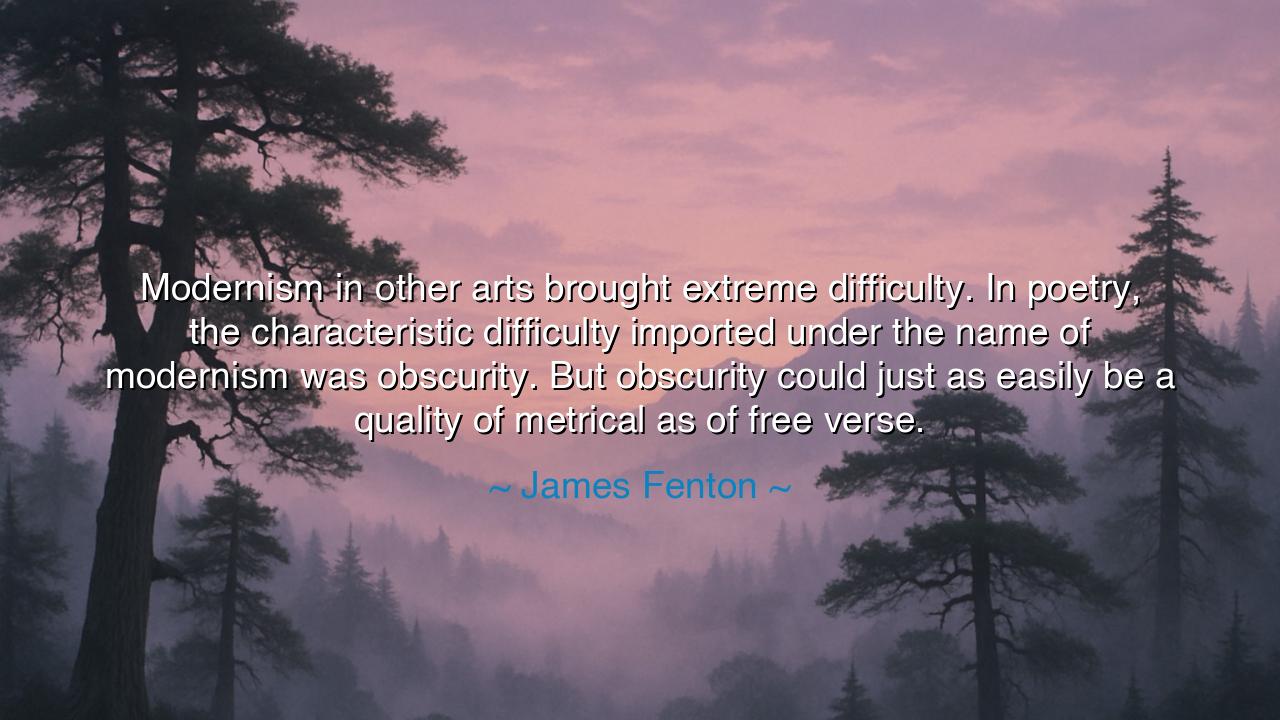
Modernism in other arts brought extreme difficulty. In poetry
Modernism in other arts brought extreme difficulty. In poetry, the characteristic difficulty imported under the name of modernism was obscurity. But obscurity could just as easily be a quality of metrical as of free verse.






James Fenton, poet and critic, once spoke with clarity about the storms that shook the house of art in the twentieth century: “Modernism in other arts brought extreme difficulty. In poetry, the characteristic difficulty imported under the name of modernism was obscurity. But obscurity could just as easily be a quality of metrical as of free verse.” In these words, he unveils a truth about modernism and the nature of poetry—that its trials do not arise merely from form, whether strict meter or liberated free verse, but from the challenge of obscurity, that veil of difficulty which can either enrich or alienate the reader.
The origin of this saying lies in the upheaval of the early 20th century, when the old traditions of art and literature were shaken by war, technology, and disillusionment. In painting, the human figure dissolved into abstraction; in music, tonality shattered into dissonance; in poetry, the old cadences of rhyme and rhythm broke apart under the banners of modernism. Readers were confronted with works like T. S. Eliot’s The Waste Land or Ezra Pound’s Cantos, dense with allusions, fragments, and languages. Many complained that poetry had grown incomprehensible. Fenton, looking back, observed that this obscurity was not bound to free verse alone—it was a challenge that could live within any form, metrical or not.
Consider the case of Gerard Manley Hopkins, who wrote decades before modernism, yet whose sprung rhythms and dense metaphors baffled readers long after his death. His poems, though metrical, were filled with such compression, such inventiveness of language, that they seemed as obscure as any modernist text. Likewise, Dante, writing in the structured meter of terza rima, fills his Divine Comedy with obscure references to Florentine politics, medieval theology, and allegory that can bewilder even the diligent reader. Thus Fenton’s words ring true: obscurity is not born of form, but of the poet’s vision and craft.
The meaning of the quote also calls us to recognize difficulty as both trial and gift. The obscurity of modernist poetry can frustrate those who seek immediate clarity, but it can also deepen the experience for those who persevere. Like a mountain shrouded in mist, the poem asks the climber to ascend slowly, to search for paths, to return again and again until the summit clears. Fenton warns us against blaming free verse for obscurity, for the fog lies not in the path, but in the terrain itself. Both the old and the new can be equally veiled.
There is a heroic lesson here for both poets and readers. The poet must recognize that obscurity can alienate as easily as it can intrigue. To cloak a poem in difficulty without purpose is to risk silence, for no reader will linger long where there is no light. Yet to embrace some measure of obscurity can also honor truth, for not all realities can be spoken plainly. The reader, likewise, must learn patience, humility, and perseverance, understanding that the greatest poems often demand labor, as gold demands the miner’s toil.
The lesson we take from Fenton is this: do not fear obscurity, but neither should you worship it. Seek balance. If you are a poet, let your obscurity arise only from the depth of your vision, not from careless indulgence. If you are a reader, do not abandon a poem at the first mist, but wrestle with it, linger with it, and return until its light reveals itself. Remember that both metrical verse and free verse are vessels—neither inherently clear, neither inherently obscure. It is the poet’s hand that determines the path.
Practically, this means reading widely, both old and new. Approach Shakespeare and Eliot, Dante and Pound, Hopkins and Whitman, and notice how clarity and obscurity dance within them all. As a writer, ask yourself: does my obscurity serve truth, or is it merely a veil to hide emptiness? As a reader, remind yourself: clarity is a treasure, but sometimes the treasure is hidden deep. The journey itself is the reward.
Thus James Fenton’s words endure as a guide across the landscape of poetry: “Obscurity could just as easily be a quality of metrical as of free verse.” Do not blame the form, nor curse the moderns, but recognize that poetry in every age demands effort, patience, and love. In this labor lies wisdom, and in wisdom, the fire that keeps poetry alive across centuries.






AAdministratorAdministrator
Welcome, honored guests. Please leave a comment, we will respond soon